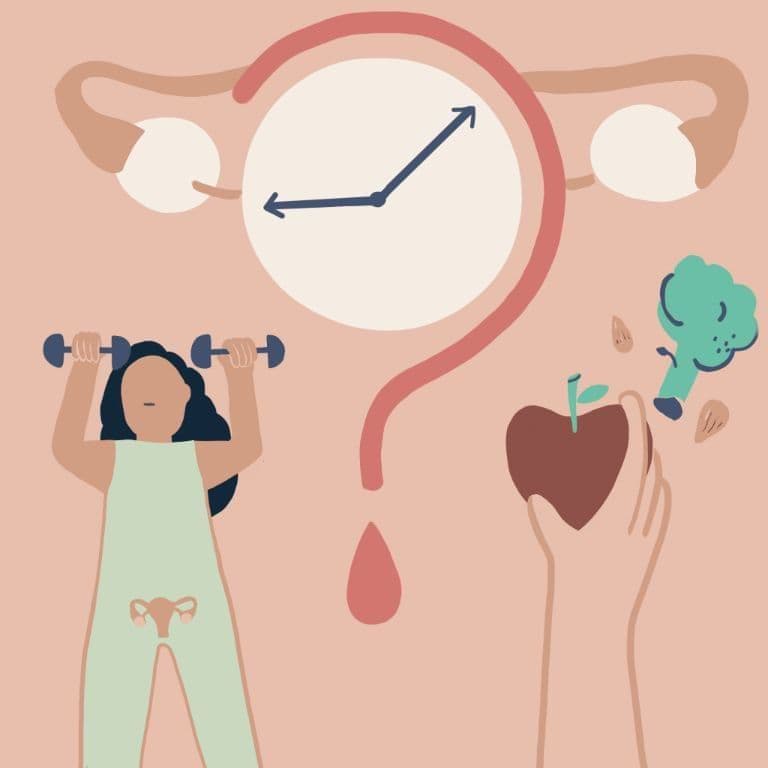This article has been compiled by Vaibhavi Kodnani, a content writer at Proactive For Her.
Irregularities in the menstrual cycle anytime past 40 years of age marks the advent of the menopause transition or the perimenopause phase. This phase can start anytime after the mid to late 40s and last between 4-7 years. After this, when you don’t get your periods for a whole year, it can be considered menopause. The hormonal imbalances during menopause can bring along many changes in the body. Typical physical side-effects of menopause include:
- Hot flashes
- Night sweats
- Flushing
- Vaginal atrophy
- Increased urination
- Dry skin, hair and nails
- Hair thinning and hair fall
- Increased hair growth on areas like face, chin, neck
- Decreased libido
- Sore breasts
- Bone loss
- Painful or stiff joints
- Bloating
- Unexpected weight gain
- Insomnia
The declining estrogen and progesterone levels in the body can also affect your psychological well-being. You may experience symptoms like:
- Mood swings
- Palpitations
- Anxiety
- Depression
Apart from these symptoms, menopause is also linked to other medical conditions such as osteopenia, osteoporosis, and heart disease. Any underlying conditions can also get aggravated.
Why is nutrition important during menopause?
All of the above mentioned physical and psychological symptoms and changes can be reduced and managed by consuming a healthy, nutritious diet. Your transition into complete menopause can also be much smoother.
What nutrients should menopausal women include in their diet?
You must consume a well-balanced diet consisting of nutrients that can help manage and reduce your menopause symptoms. As far as possible, eat home-cooked meals that have all of the below-mentioned list of nutrients.
- Protein
The declining estrogen levels also reduce muscle mass and bone strength. If not cared for, it can lead to painful and stiff joints and conditions like osteoporosis and osteopenia. It can increase your risk for fractures. Hence, to maintain your muscle mass and bone density, a good quality protein is extremely essential. It is also crucial for our gut health.
Collagen is one of the proteins found in the highest amounts in our body. It is necessary for the mobility of our joints and the elasticity of our skin. But as we age, the collagen synthesis also starts reducing, thus leading to joint pain, skin dryness, wrinkles and other such changes.
Therefore, adding good quality protein and collagen to your diet can have various benefits once you start ageing. Ageing is inevitable, but a nutritious diet can help slow it down and stop the symptoms from aggravating to great extents. Between 20-30% of your total caloric intake should come from protein.
Sources of protein: good quality organic free-range chicken, fatty fish, non-GMO soy and soy products like tofu, all dals, lentils, pulses
Sources of collagen: bone broth, collagen supplement
Daily intake: at least 1 gm/ per kg of the bodyweight - Fibre
To manage body changes such as weight gain, bloating, increase your fibre intake. Fibre helps improve your bowel movement and maintain your gut health. The gut and the brain are interconnected. So by improving your gut health, you can avoid getting anxiety or depression. Your blood sugar levels will be stable by eating enough fibre-rich foods. Even your elevated triglyceride or cholesterol levels will gradually come down.
The fibre part also provides a good amount of B Vitamins like thymine, niacin, riboflavin - all of this help reduce the risk of heart disease and even cancer. It helps manage weight also.
Sources: All fruits and vegetables are rich sources of fibre.
Soluble fibre - all whole grains like whole wheat, millets, barley, oats, bananas.
Insoluble fibre - all dark green leafy vegetables like spinach, fenugreek.
Daily intake: 25-30 gm/ per day - Antioxidants
All fruits and vegetables contain antioxidants that help to reverse the signs of ageing. They improve your skin health and reduce the risk of heart diseases, thus helping with your menopause symptoms.
Sources: all fresh fruits and vegetables; all kinds of fresh berries like strawberries, blackberries, etc. - Healthy fats
Healthy fats in the right amounts are essential for various functions in the body. We need fat for hormone production, digestion, and to reduce the bad cholesterol in our bodies. Certain healthy fats also have antioxidant properties and anti-inflammatory effects. They even improve the cognitive function of our bodies.
Sources: Sources: nuts like almonds, walnuts, hazelnuts, pistachios; oilseeds, pumpkin seeds, flaxseeds, sunflower seeds, avocados, unrefined oils for cooking that are cold-pressed or wood pressed oils like sesame seeds oil, mustard seeds oil, virgin olive oil, virgin coconut oil; ghee - Calcium
With the estrogen declining, bone loss starts happening. Hence, we need to ensure an adequate amount of calcium in the diet because it directly affects our bone density.
Sources: local Indian cattle milk, all dark green leafy vegetables, soy, tofu, soy milk, home set curd, ragi, amaranth, broccoli, sesame seeds, chickpeas
Daily intake: 1000 mg/ per day - Vitamin D and Vitamin K
Vitamin D and Vitamin K are crucial for the absorption of calcium in our bodies. Hence it is crucial to get enough of these vitamins so that whatever calcium you are eating is optimally used by the body.
Sources of Vitamin D: Most of the population is deficient in Vitamin D. There are very few food sources of Vitamin D like free-range egg yolks and mushrooms. Hence, the best source of Vitamin D is sunlight. Sitting in the morning sun (until 11 am) every day for 20-25 mins is beneficial. If it is not possible to get exposure to morning sunlight daily, then getting on a Vitamin D supplement is a good alternative.
Daily intake of Vitamin D: 200-300 IU every day
Sources of Vitamin K: all fruits and vegetables; all the green leafy vegetables such as spinach, cabbage, kale - Magnesium
Magnesium helps to reduce anxiety. It is also a crucial component of our bones, making it all the more important to consume it during menopause. Magnesium-rich foods also help the body to relax and recover better, thus improving our sleep quality. It also reduces muscle spasms, preventing any strain or stress injuries from occurring.
Sources: Spinach, dark chocolates, almonds, walnuts, lavender tea, chamomile tea, pumpkin seeds
Daily intake: 300-350 mg/ per day - Potassium
If you often feel heavily bloated, then potassium-rich foods are beneficial for the body as they will help provide relief from your bloating symptoms.
Sources: bananas, coconut water, avocados, raisins, potatoes
Which foods should you avoid and why?
There is no need to follow extreme diets as that can be counterproductive. But, you must strive to eliminate the following list of foods from your diet. Since complete elimination can be tough, at least limit their intake. Find healthier alternatives to these foods.
- Processed foods: Heavily processed foods increase your risk of insulin resistance that can aggravate type 2 diabetes and metabolic syndrome. These foods also trigger menopause symptoms like hot flashes, mood swings and weight gain. Processed or trans fats such as refined oils, hydrogenated oils, dalda, lard should also be avoided.
- Refined foods: Foods made with refined sugar and refined flour are also detrimental to your health.
- Salty or deep-fried foods: Salty foods lead to water retention in the body. It will make you feel heavy and bloated. Eating these foods too often can also put you at risk of heart disease. Deep-fried foods are inflammatory. They increase your weight, bad cholesterol and triglyceride levels.
- Alcohol and recreational drugs: These can trigger hot flashes and make you feel bloated.
Apart from these foods, if you are intolerant or allergic to any particular foods, avoid their consumption. You will also have to be mindful of certain food restrictions in different clinical conditions. Consult your doctor to understand if you need to avoid any specific foods.
Should you take any supplements?
Firstly, you must try to incorporate all the healthy diet changes and improve your eating habits. But, if you are unable to meet your daily nutrient requirements, then getting on supplements is a good choice. It will prevent your symptoms from aggravating. Always consult your doctor to understand your nutrient deficiencies and the recommended supplements in the correct dosages.
The following supplements are beneficial in menopause:
- Calcium
- Vitamin B3
- Vitamin B12
- Protein
- Collagen
- Omega-3 fatty acid
When should you start incorporating these changes?
It is recommended to incorporate these diet changes as early as possible. Maintaining a healthy diet and lifestyle from an early age will help you manage menopause symptoms much better later.
Conclusion
Menopause is an inevitable part of every woman’s life. The body goes through drastic changes during this period, and to manage and adapt to these changes, your diet plays an important role.
It may seem too confusing and complicated, but it is simple. Keep the following rules in mind, and you will not have too many problems:
- Consume natural foods as they have a better nutrient profile. Eat seasonal fruits and vegetables as they contain nutrients that our body requires to sustain during that period of the year.
- Avoid processed, fatty, and overly refined foods.
- Get on supplements after consulting your doctor.
- Hydrate yourself well.
Disclaimer - This information is provided for educational purposes and should not be construed as medical advice. Please consult with your healthcare practitioners before undertaking any changes in your diet or adding supplements.
Proactive For Her is a digital clinic for women, offering accessible, personalized, and confidential healthcare solutions. We offer products and services for out-patient health concerns of Indian women, across their lifetime - from puberty to pregnancy to menopause. To know more on the sexual and reproductive health of women, visit https://www.proactiveforher.com/

